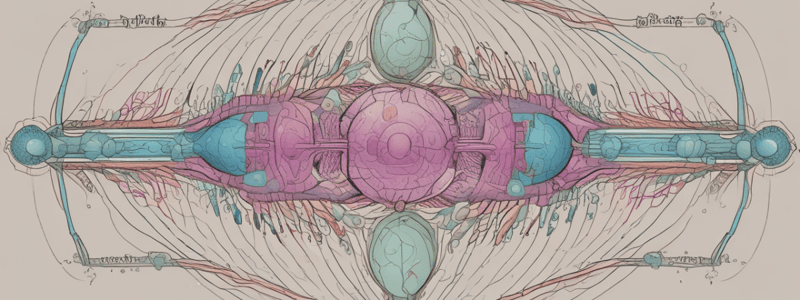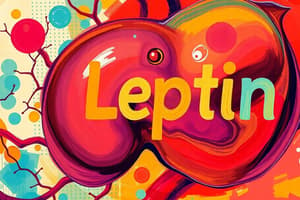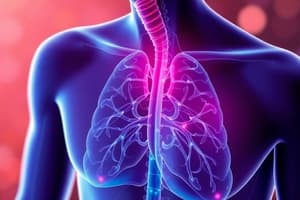Podcast
Questions and Answers
What is the effect of adrenaline on insulin secretion?
What is the effect of adrenaline on insulin secretion?
- It increases the uptake of amino acids by the pancreatic β cell
- It stimulates insulin secretion
- It has no effect on insulin secretion
- It inhibits insulin secretion (correct)
What is the primary function of glucagon in the body?
What is the primary function of glucagon in the body?
- To stimulate fatty acid synthesis and storage from CHO
- To stimulate glycogen synthesis and storage
- To prevent hypoglycaemia after a protein meal (correct)
- To promote fuel storage after a meal
What is the result of insulin binding to its receptor on the pancreatic β cell?
What is the result of insulin binding to its receptor on the pancreatic β cell?
- Ca+ channel closes, leading to insulin inhibition
- K+ channel opens, leading to insulin secretion
- K+ channel closes, leading to insulin secretion (correct)
- ATP is released, leading to glucagon secretion
What is the role of Ca+ in insulin secretion?
What is the role of Ca+ in insulin secretion?
What is the result of insulin promoting fuel storage after a meal?
What is the result of insulin promoting fuel storage after a meal?
What is the structure of the insulin receptor?
What is the structure of the insulin receptor?
What is the primary function of insulin in the body?
What is the primary function of insulin in the body?
What is the primary function of glucagon in the body?
What is the primary function of glucagon in the body?
What is the primary location of the pancreatic islets?
What is the primary location of the pancreatic islets?
What type of modification occurs to enzymes in response to changes in metabolic patterns?
What type of modification occurs to enzymes in response to changes in metabolic patterns?
What is the primary stimulus for insulin secretion?
What is the primary stimulus for insulin secretion?
What is the primary function of the δ cells in the pancreatic islets?
What is the primary function of the δ cells in the pancreatic islets?
What is the percentage of the pancreatic mass that is composed of islets?
What is the percentage of the pancreatic mass that is composed of islets?
What is the primary mechanism by which the body stores metabolic fuel?
What is the primary mechanism by which the body stores metabolic fuel?
Which of the following tissues do not require insulin to use glucose?
Which of the following tissues do not require insulin to use glucose?
What is the effect of high concentrations of insulin on its receptors?
What is the effect of high concentrations of insulin on its receptors?
What is the primary function of glucagon during fasting?
What is the primary function of glucagon during fasting?
What is the effect of adrenaline on muscle and liver?
What is the effect of adrenaline on muscle and liver?
What is the primary function of cortisol?
What is the primary function of cortisol?
What happens to blood glucose and insulin levels after a high-carbohydrate meal?
What happens to blood glucose and insulin levels after a high-carbohydrate meal?
What is the role of the liver in the fed state?
What is the role of the liver in the fed state?
What is the effect of glucokinase on glucose metabolism in the liver?
What is the effect of glucokinase on glucose metabolism in the liver?
What is the function of the β subunit of the insulin receptor?
What is the function of the β subunit of the insulin receptor?
What is the role of PI3 kinase in the insulin signaling pathway?
What is the role of PI3 kinase in the insulin signaling pathway?
What is the effect of insulin on glycogen synthesis in muscle and liver?
What is the effect of insulin on glycogen synthesis in muscle and liver?
What is the role of Akt/PKB in glucose transport?
What is the role of Akt/PKB in glucose transport?
What is the effect of insulin on lipolysis in adipocytes?
What is the effect of insulin on lipolysis in adipocytes?
What is the role of Ras in the insulin signaling pathway?
What is the role of Ras in the insulin signaling pathway?
What is the effect of insulin on gene expression?
What is the effect of insulin on gene expression?
What is the role of SHC in the insulin signaling pathway?
What is the role of SHC in the insulin signaling pathway?
What is the effect of insulin on GLUT4 in muscle and adipose tissue?
What is the effect of insulin on GLUT4 in muscle and adipose tissue?
What is the role of PDK1 in the insulin signaling pathway?
What is the role of PDK1 in the insulin signaling pathway?
Study Notes
Hormonal Regulation of Metabolism
- The demand for fuel is constant, but the supply is intermittent, and the body adapts by storing metabolic fuel when available and mobilizing it in starvation, injury, and stress.
Changes in Metabolic Patterns
- Changes in metabolic patterns are achieved through:
- Variation in the amount of available fatty acid (FA) use in starvation
- Allosteric effects on enzymes (e.g., AMP and PFK in muscle)
- Covalent modification of enzymes (e.g., phosphorylation of glycogen phosphorylase and synthetase)
- Changes in enzyme synthesis (e.g., glucokinase and dietary CHO, HMG CoA reductase, and cholesterol synthesis)
Main Hormones Controlling Intermediary Metabolism
- Insulin and glucagon are the prime regulators of metabolism
- Insulin is the only hypoglycaemic hormone and promotes fuel storage after a meal, growth, glycogen synthesis, fatty acid synthesis, and amino acid uptake
- Glucagon is a hyperglycaemic hormone that mobilizes fuel, maintains blood glucose during fasting, and promotes glycogenolysis, gluconeogenesis, and fatty acid release
Pancreatic Islets
- The endocrine part of the pancreas (Islets of Langerhans) contains:
- β cells (60-70%) that secrete insulin
- α cells (30-40%) that secrete glucagon
- δ cells that secrete somatostatin
- Insulin secretion is stimulated by a rise in blood glucose, amino acid concentration, and gut hormones (e.g., secretin) and inhibited by adrenaline
Control of Insulin Secretion
- Regulation of insulin secretion involves:
- Binding of glucose, amino acids, and gut hormones to receptors on pancreatic β cells
- Closing of ATP-sensitive K+ channels, increasing Ca2+ influx, and insulin release
Processing of Pro-Insulin into Insulin and C Peptide
- Not specified in the provided text
Metabolic Effects of Insulin
- Insulin promotes:
- Fuel storage after a meal
- Growth and glycogen synthesis
- Fatty acid synthesis and storage from CHO
- Amino acid uptake and protein synthesis
Structure of the Insulin Receptor
- The insulin receptor consists of:
- α subunit (extracellular)
- β subunit (transmembrane and intracellular)
- Binding of insulin to the receptor activates the tyrosine kinase, leading to growth-promoting activity
Metabolic Effects of Glucagon
- Glucagon:
- Mobilizes fuel during fasting
- Maintains blood glucose during fasting
- Activates glycogenolysis, gluconeogenesis, and fatty acid release
- Stimulates uptake of amino acids by the liver for gluconeogenesis
Other Hormones Affecting Metabolism
- Adrenaline (adrenal medulla) mobilizes fuel during stress
- Cortisol (adrenal cortex) provides for long-term requirements, stimulating amino acid mobilization from muscle, gluconeogenesis, and fatty acid release from adipose tissue
Studying That Suits You
Use AI to generate personalized quizzes and flashcards to suit your learning preferences.
Description
This quiz explores how hormone concentration changes enable the body to store and mobilize metabolic fuel in response to availability, starvation, injury, and stress. It delves into the variations in metabolic patterns and the roles of enzymes in this process.




